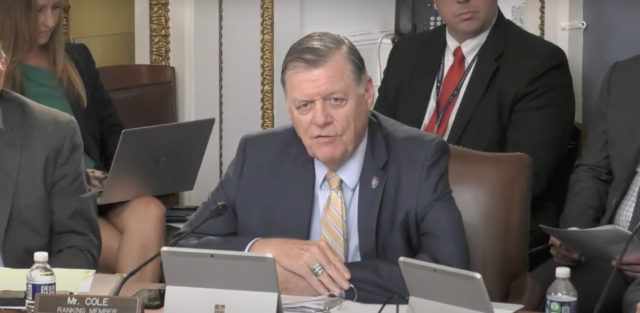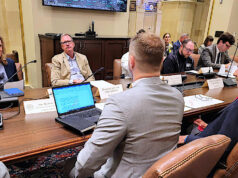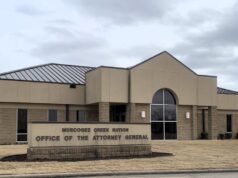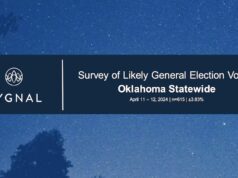

WASHINGTON — The U.S. House passed a major appropriations bill along party lines Thursday, without amendments proposed by members of the Oklahoma delegation.
The bill passed by a vote of 219-208, with only Democrats voting for the bill and only Republicans voting against. The bill includes funds for several government departments and agencies for fiscal year 2022.
Both Reps. Tom Cole (R-OK4) and Kevin Hern (R-OK1) submitted amendments for inclusion on the bill, all of which were turned down by the Democratic majority.
This story was reported by Gaylord News, a Washington reporting project of the Gaylord College of Journalism and Mass Communication at the University of Oklahoma.
Cole’s amendment, which would have provided more than $150 million in funding to help with tribal judicial systems after the McGirt v. Oklahoma Supreme Court decision that found Congress had never disestablished the Muscogee Nation, was voted down by Democrats en masse, along with other Republican-proposed amendments.
Cole, a Chickasaw Nation citizen, then voted against the overall appropriations package, tracing his opposition to the bill to partisanship in his floor remarks.
“The problems with this bill aren’t just with the money spent,” he said. “In drafting this package, the majority has also chosen to strip out longstanding bipartisan policy provisions, and instead has filled this package with partisan, far-left policy that simply cannot pass both chambers and become law.”
Hern’s six amendments to the bill, which were voted against in a group by themselves, aimed to cut 20 percent of spending from each bill combined in the appropriations package.
“Speaker (Nancy) Pelosi doesn’t want fiscal accountability, which is why she piled all of my amendments into an en bloc to ensure none of them pass,” Hern said in his remarks on the House floor. “Congress has spent recklessly in the last year, and the American people are sick of it.”
None of the other members of the Oklahoma delegation submitted amendments that saw debate on the House floor.
Rep. Frank Lucas (R-OK3) released a statement explaining his views about the passage of H.R. 4502.
“The American people deserve a Congress who is willing to put partisanship aside in order to keep the lights of the federal government on,” he said.
Democrats praised the passage of the bill and said the increases in funding will help people devastated by the COVID-19 pandemic.
“Together, our transformative and historic funding increases will create good-paying jobs, grow opportunity for the middle class and small businesses and provide a lifeline for working families and the vulnerable,” said House Appropriations Chair Rosa DeLauro (D-CN3). “I am particularly proud that the funding increases in the labor, health and human services and education bill will help create a society that provides people with the help they so desperately need.”
The bill has the strong support of President Joe Biden’s administration, which praised the increases in spending in the wake of the pandemic.
“Over the past decade, due in large measure to overly restrictive budget caps, the nation significantly underinvested in core priorities such as education, research and public health that are vital to our prosperity and strength,” the Biden administration said in a statement. “The administration looks forward to working with Congress as the FY 2022 appropriations process moves forward.”
‘A critical role for the federal government’
The McGirt decision, although generally welcomed by the tribes, also created new expenses for them. As a result, tribes have been looking to the federal government for more money to improve tribal judicial infrastructure.
Earlier in the week, Cole outlined the issue to his colleagues in a House committee.
“The tribes are spending tens of millions of dollars that none of them budgeted for, and this is not their obligation,” Cole said. “This is a federal government trust responsibility on Indian land.”
In testimony last month before the House Natural Resources Committee, David Hill, principal chief of the Muscogee Nation, said his tribe had taken steps to respond to the jurisdictional changes wrought by McGirt and urged the federal government to do its part.
“However, there remains a critical role for the federal government in building capacity to manage the long-term post-McGirt workload,” Hill said. “The McGirt decision does not change the trust obligation or create any new federal responsibilities, it magnifies the systemic lack of investment.”
The McGirt decision has also drawn attention to other Native American treaties that were never disestablished by Congress, such as the Treaty of 1866, which ended slavery in the Cherokee Nation and granted freed slaves the rights of native Cherokees.
Chuck Hoskin, principal chief of the Cherokee Nation, offered testimony Tuesday in the House Financial Services Committee regarding the Cherokee Freedmen and the issues that Freedmen have faced in Native American communities.
“We are on a path of reconciliation, but we need to do more than acknowledge the legal principle of equality — we must seek to embrace the spirit of equality each day,” Hoskin said in his prepared testimony. “Because no nation can truly prosper when any of its citizens are victims of discrimination.”
Marilyn Vann, president of the Descendants of Freedmen of the Five Tribes Association, discussed the tribe’s obligation to hold up its end of the treaties they made with the Freedmen.
“However, just as the U.S. Supreme Court determined the U.S. government did not have a unilateral right to break Article 3 of its 1866 treaty agreement with the Muscogee (Creek) Nation, the tribes do not have a unilateral right to remove treaty rights from the Freedmen,” Vann said.





















